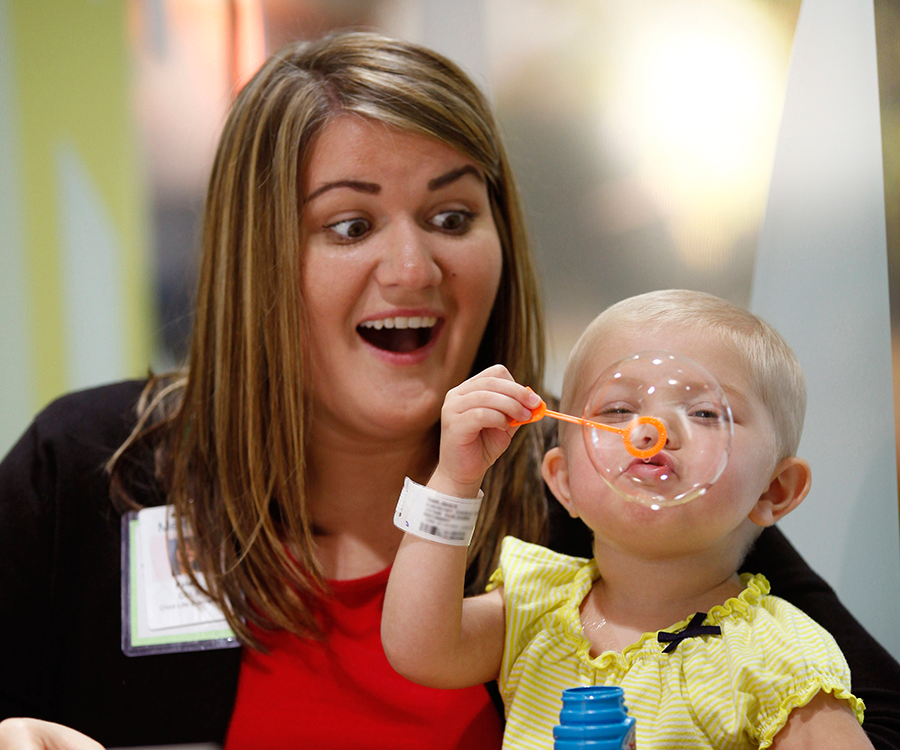Health
Mercy Kids
Learn how the child life specialists at Mercy Kids bring a little bit of joy to a child’s hospital stay.
Written by Savannah Waszczuk | Photos courtesy Mercy, Shutterstock
May 2016

It’s no secret that hospitals are sometimes scary places, even for adults. Now imagine that you are a kid, and you learn you have to stay at a hospital for your first time away from home, or you’re dealing with an illness that you don’t understand. Luckily, Mercy Kids (1235 E. Cherokee St., Springfield, 417-820-2000, mercy.net) has is a team of people dedicated to help all of 417-land’s pint-sized patients. “We have a team of five child life specialists here at Mercy,” says Ashley Wilson, Child Life Services Manager at Mercy Kids. “Our jobs are to do anything we can to reduce anxiety for patients and their families.” This includes aesthetic things, like working with decision makers to plan kid-friendly environments where the children wait and even in the rooms where they stay. But it also includes much more. Wilson shares all of the ways she and her team work to make sure that children in the hospital have the best experience possible, and that their families have all of the support they need during the difficult time.
1. Give Prep Talks
“When kids are in the hospital, they have a lot of new things happening to them,” Wilson says. “These things are often unfamiliar, invasive and scary for young patients.” To reduce anxiety, a child life specialist talks to them about what is to come. “We take medical words and jargon, and break it down into age-appropriate language,” Wilson says. An example of this is talking to a child before they receive Intravenous therapy (an IV). “We will make sure they know what they are going to see, feel and hear during the process,” Wilson says.
2. Provide Aid and Explanation
After explaining an upcoming medical procedure to a child, the child life specialist often stays around during the actual process. “Some kids will want us to play a game with them, like I-spy,” Wilson says. “Others may just want us to be there to have a conversation and provide support.” Having that somewhat familiar face helps with comforting the child during the difficult time.
3. Offer Choices
Any time a child is in the hospital, most of what happens to them is out of their control. This is why when there’s an opportunity to give a child a choice, they do it. “It may be something as simple as, ‘What arm do you want your poke in?,’ or ‘Do you want to watch or look away during your IV?’” Wilson says. “We’ll ask them, ‘Do you want to watch this movie, or play a game on the iPad?’ As long as it’s an appropriate choice, we try to give it to them.”
4. Provide Emotional Support
Any time a family comes into the hospital with a sick child, many emotions are involved. “Sometimes we’re simply there for an empathic ear,” Wilson says. This can be for family members or for the patients themselves. “Sometimes we’re talking to a pediatric patient, or sometimes it’s their sibling, who is also a child.”
5. Offer Bereavement Support
Child life specialists also provide bereavement support to those coping with the loss of a loved one. “We talk to children about what’s going on, and we’ll tell them about community resources available and how they can utilize them,” Wilson says. “We can help them create lasting memories of the loved one with mementos.” This includes tangible items, including fingerprint charms, 3-D molds of a hand or a foot or even a lock of hair. “We have a couple different options depending on what the scenario is,” Wilson says.
6. Help Others
When people think about the job of a child life specialist, they often think the specialist is helping pediatric patients. And this is usually the case. But they can also reach out and help other kids who are at Mercy, like kids who have ill parents and may visit the hospital during their parent’s treatment. “We also reach out to other kids, as long as the child is within the walls of Mercy,” Wilson says. There are several activities in place for these kids, including child-size bikes and tricycles with designated safe routes where they can ride, a small basketball court area where they can shoot hoops and even scavenger hunts throughout the hospital.
7. Coordinate Out-Patient Activities
There is a St. Jude affiliate clinic at Mercy Hospital that has kids who come in once per week. “These are children who aren’t able to do things like go to school or go to birthday parties,” Wilson says. “We have one child life specialist dedicated to that clinic.” That’s where Child Life Specialist Kristi Donovan comes in. Her job is to provide activities for these kids, including bringing in special guests, providing arts and crafts activities and planning events that make their clinic day fun. If a child will be out of school for a while, Donovan may also visit their class and provide education to their classmates about why the student will be out.
8. Give Positive Reinforcement
If a pediatric patient has a goal to work toward, they may track their progress on something like a sticker chart. Once they meet their goal, they may be given a toy as a form of positive reinforcement. “We receive donations for the children’s hospital, and those donations are used for reinforcement,” Wilson says. “They’re also used on special holidays and birthdays.”












